Increasing the Number of Elected Women Representatives in Tanzania’s Parliament: Challenges and Strategies
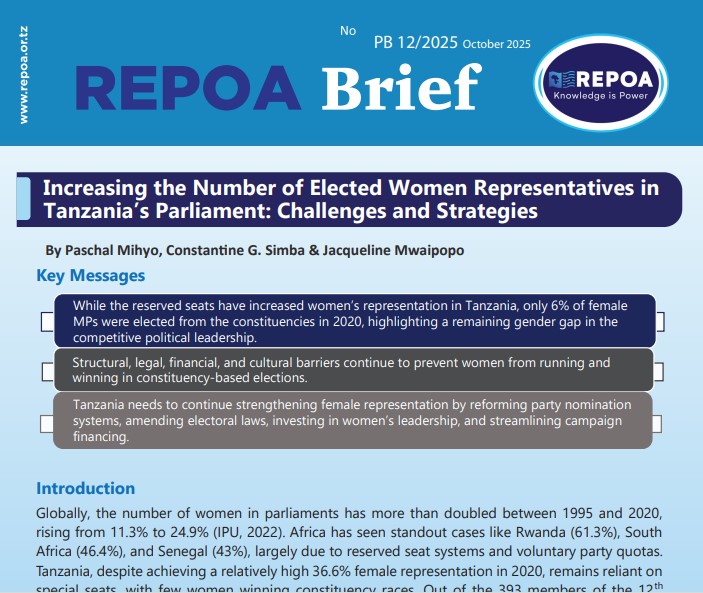
This brief draws on data from the National Electoral Commission, parliamentary records (1985–2020), media reports, and selected secondary studies on women in politics in Tanzania and other African countries, and data compiled from selected local government authority websites (2025) for the number of councillors. This research was conducted in early 2025, immediately after the local […]
Learning from the Experience of the Namibian Blue Economy 2
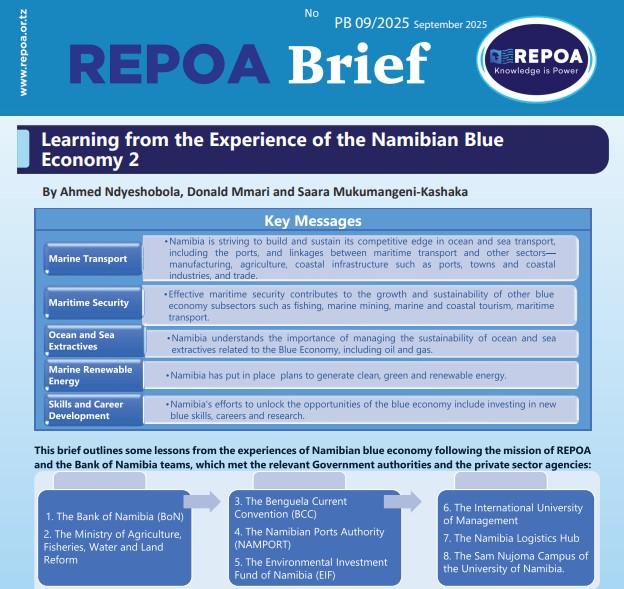
This Policy Brief outlines some lessons from the experiences of Namibian blue economy following the mission of REPOA and the Bank of Namibia teams, which met the relevant Government authorities and the private sector agencies there. READ ON…!
Learning from the Experience of the Namibian Blue Economy 1
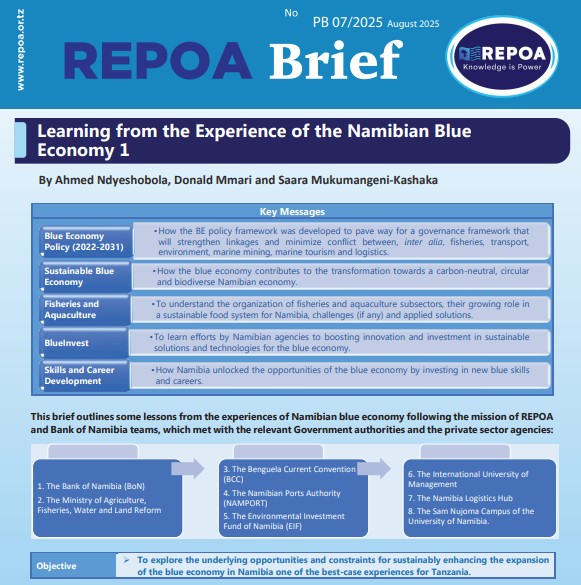
This Policy Brief outlines some lessons from the experiences of Namibian blue economy following the mission of REPOA and Bank of Namibia teams, which met with the relevant Government authorities and the private sector agencies there. READ ON…!
Building on Productive Capacities in Tanzania-Opportunities and Constraints in the Horticulture Sub-Sector
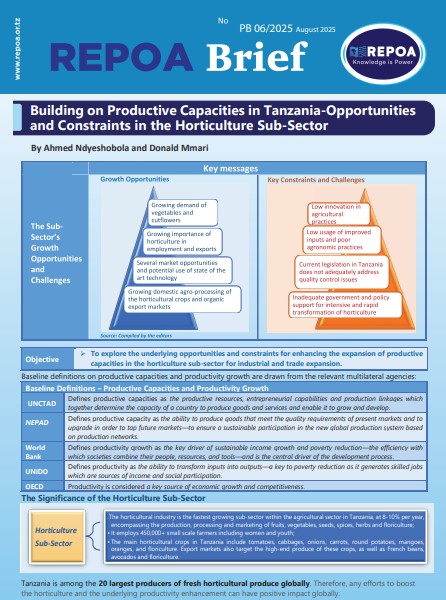
This Policy Briefs explores the underlying opportunities and constraints for enhancing the expansion of productive capacities in the horticulture sub-sector for industrial and trade expansion in Tanzania. For details please, READ ON…!
Building productive capacities in Tanzania—opportunities and constraints in the coffee sub-sector
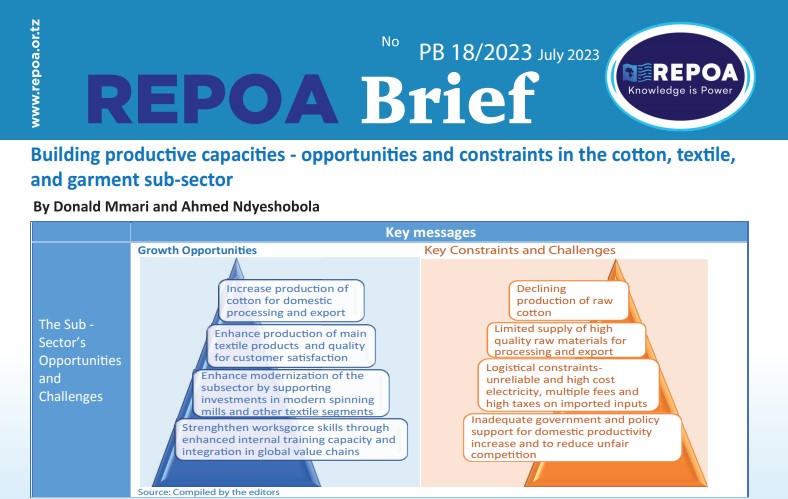
It is recommended that this framework of analysis is adapted to inform policy analysts, private sector practitioners, and decision makers in public institutions responsible for promoting economic growth; agriculture and cooperative development; investments, trade, and industrial development; private sector development, and providing the requisite political champion for the coffee sub-sector. It is the ability these […]
Building productive capacities – opportunities and constraints in the cashew nut sub-sector

This policy brief provides a framework of analysis on building productive capacities in Tanzania – regarding opportunities and constraints in the cashew nut sub-sector. This brief seeks to inform policy analysts, private sector practitioners, and decision makers in the public institutions responsible for promoting economic growth, industrial development, investments, trade expansion, private sector development, and […]
Building productive capacities – opportunities and constraints in the tea sub-sector

This policy brief provides a framework of analysis on building productive capacities in Tanzania – regarding opportunities and constraints in the tea sub-sector. This brief seeks to inform policy analysts, private sector practitioners, and decision makers in the public institutions responsible for promoting economic growth, industrial development, investments, trade expansion, private sector development, and providing […]
Status of the Transition to a Nature-Positive Green Economy in Tanzania
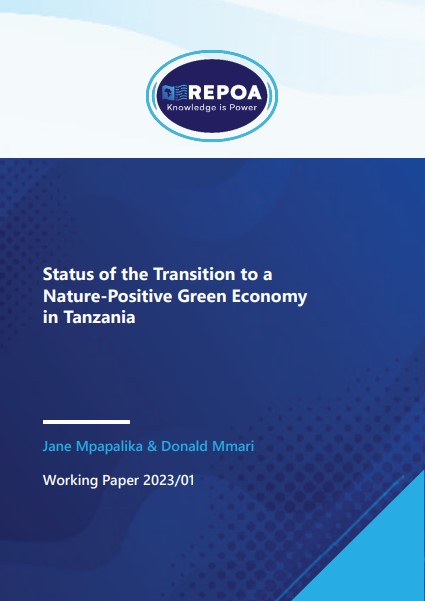
REPOA would like to extend its sincere gratitude for the financial support provided by the Green Economy Coalition (GEC) secretariat in London through ACODE to develop this working paper. The work presented in this paper has been funded by the MAVA Foundation through the Economics for Nature (E4N) programme. This paper assesses the status of […]
Building productive capacities in Tanzania – opportunities and constraints in the coffee sub-sector

This policy brief provides a framework of analysis on building productive capacities in Tanzania – regarding opportunities and constraints in the coffee sub-sector. This brief seeks to inform policy analysts, private sector practitioners, and decision makers in public institutions responsible for promoting economic growth; agriculture and cooperative development; investments, trade, and industrial development; private sector […]
Harnessing the continental opportunities for enhancing productive capacities in Tanzania
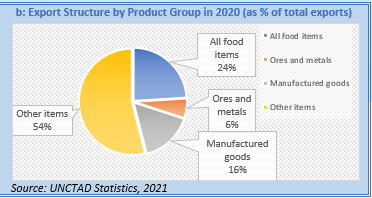
This policy brief provides a framework of analysis regarding harnessing the continental opportunities for enhancing productive capacities in Tanzania. It seeks to inform policy analysts, private sector practitioners, and decision makers in public institutions responsible for promoting economic growth, industrial development, investments, trade expansion, and private sector development. It is the ability these actors to […]
Participation in regional and global value chains can enhance productive capacity for industrial and trade expansion
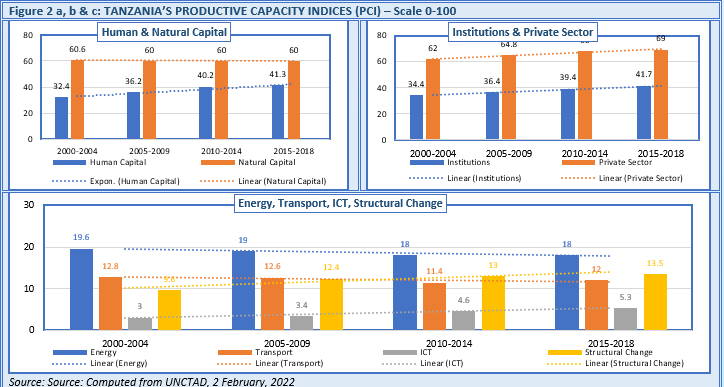
This policy brief provides a framework of analysis regarding the participation in regional and global value chains to enhance productive capacity for industrial and trade expansion. It seeks to inform policy analysts, private sector practitioners, and decision makers in public institutions responsible for promoting economic growth, industrial development, investments, trade expansion, and private sector development. […]
Drivers of productive capacity for industrial and trade expansion in Tanzania
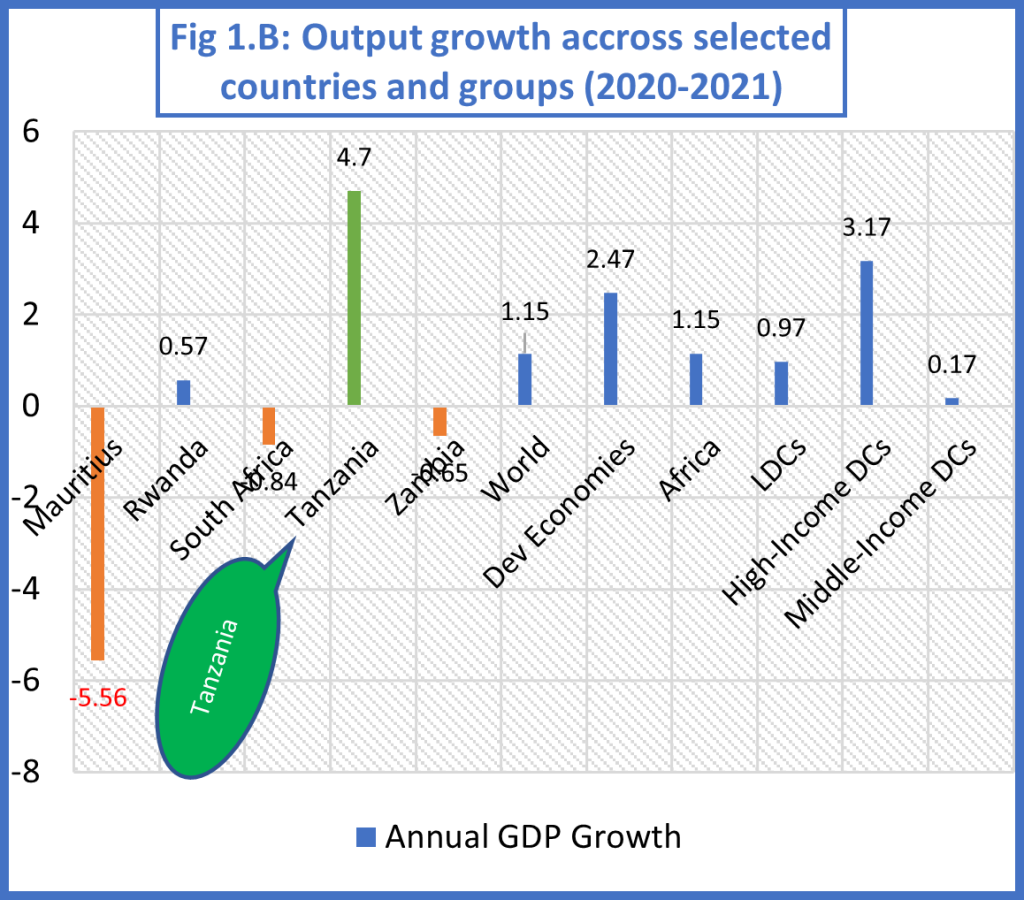
This policy brief provides a framework of analysis seeking to inform policy analysts, private sector practitioners, and decision makers in public institutions responsible for promoting economic growth, industrial development, investments, trade expansion, and private sector development. It is the ability these actors to address the various constraints to productivity growth that Tanzania can sustain its […]
Trade, Productivity and competitiveness
This policy brief aims at assessing the trade development and competitiveness of Tanzania by assessing the productivity of its firms against the background of further integration into the East African Community (EAC). The note addresses both the export premium of an internationalization strategy, the opportunities for specialization within the EAC and the impact of the […]
Productivity premia and firm heterogeneity in Eastern Africa
The gap between national export premium and foreign-ownership premium is stronger in manufacturing firms as opposed to service sectors. Moreover, we find clear and strong productivity premia in size, training programmes and level of development in the manufacturing firms. In the services sector, these premia are always smaller and only significant for medium-sized firms. There […]
Uwezeshaji wa Wananawake Kwenye Uzalishaji,Utafutaji wa Kipato, Umiliki wa Raslimali na Uongozi KupitiaMpango wa Kukuza Uwezo wa Kaya Maskini (PSSN)
Kitabu kinachohusu Uwezeshaji wa Wanawake Tanzania kama sehemu ya Sera za Kudumisha Ustawi wa Jamii (Empowering Women in Tanzania in the Contexts of Contemporary Social Policy) kimetolewa na REPOA kwa madhumuni ya kutoa uchambuzi wa kisera, matukio na taasisi ambazo ni sehemu ya mihimili ya jitihada za serikali za kuwawezesha wanawake Tanzania. Dokezo hili linatoa […]
Uwiano Kati ya Aina ya Kazi, Taarifa Kuhusu Kazi,Stadi za Kazi, na Elimu
Kwenye dokezo hili tunanatoa muhstasari mfupi wa sura mbali mbali zilizopo kwenye kitabu kiitwacho ‘Youth Transition from School to Work: A Case Study of VETA in Tanzania (Kipindi cha Mpito kwa Vijana Kati ya Mafunzo na Ajira: Mchango wa VETA Tanzania), chenye lengo la kuongeza uelewa wa matatizo wanayopitia vijana kwenye jitihada zao za kutafuta […]